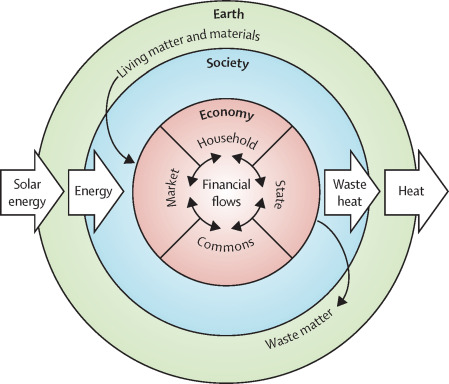A thread of my reactions to @Leigh_Phillips attack on degrowth in his @_ourEconomy article. #degrowth #postgrowth #ecologicaleconomics #Socialism
It is an example of the way pro-growth socialist environmentalism often dresses up social democratic & capitalist ideas in radical rhetoric. Most of the logic undermines socialism as much as degrowth.
For example Phillips argues that CFCs got regulated away, and we didn't have to give up hairspray. For him, this is an example of how regulating markets can lead to absolute decoupling. Ergo we don't need degrowth. But by the same logic, we don't need socialism either.
Paraphrasing the article: Socialists like Phillips argue that absolute decoupling is impossible under capitalism. Yet CFCs prove this isn't the case.
To be clear I don't think regulated capitalism will save us. (as I set out here: newsocialist.org.uk/climate-capita…). But Phillips logic is weak because there are clear differences between past regulation successes and the ones we face wrt to fossil fuels.
The big difference is admitted by Phillips later in his piece: fossil fuels are the basis of the modern economy. You can't regulate away the thing that makes the economy possible. You need an entirely new kind of economy for that.
But this difference undermines Phillips case against degrowth. His CFC based 'proof' of decoupling no longer holds.
Now onto example 2: only the innovative state can save us.
Now onto example 2: only the innovative state can save us.
Phillips arguments turns on three points 1) everything is materially based 2)any significant reduction in the amount of goods and services is austerity/thatcherism that will make our lives worse. He rejects degrowth because it violates 2. Instead he argues that
3) we need innovation to reduce the material basis of our prosperity.
Phillips mocks capitalists, saying they believe the innovation will just arrive magically like manna from heaven. Rather he says we have to take control of innovation and use the state to innovate.
Phillips mocks capitalists, saying they believe the innovation will just arrive magically like manna from heaven. Rather he says we have to take control of innovation and use the state to innovate.
This is a strawman. Eco-capitalists don;t believe that innovation will come from nowhere. They believe (following Phillips logic around CFCs) that regulated markets are *the best* institution we have for delivering innovation.
Phillips has to mock them and setup a strawman because his own position is essentially the same. Phillips is also relying on manna from heaven. It's just his heaven is the state not the market.
Again we see how pro-growth socialist environmentalism relies on the same logics as social democracy. Innovation will save us! Because of this it makes only a very weak case for socialism.
After all, we know that markets are good at innovating and deploying state innovations (think of all that lovely hairspray we have now!). So why have socialism when you could have social democracy? That way you get to use the state and the market!
TLDR: pro-growth socialist environmentalism uses radical rhetoric to defend the status quo. Its vision of the future is little more than a slightly more regulated capitalism. Fine. But hardly the case for radical freedom that it claims to be.
p.s. me and @JKSteinberger set out the basis of some postgrowth arguments here in @_ourEconomy here: opendemocracy.net/en/oureconomy/…
• • •
Missing some Tweet in this thread? You can try to
force a refresh





